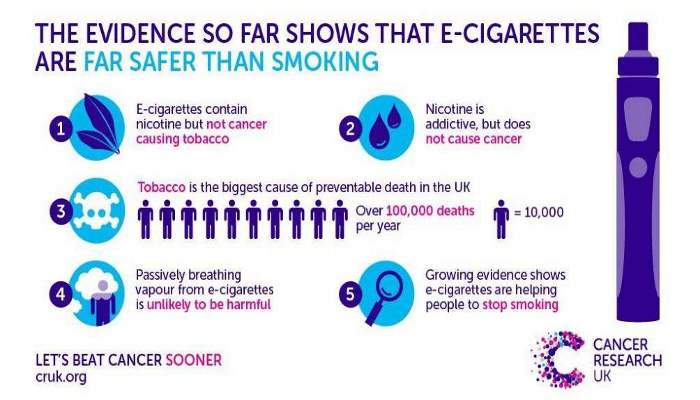Vaping view: UK VS US

It's been over a year since Public Health England posted their landmark research into E-cigarettes. The study, which was supported by a number of prominent bodies, including the NHS, concluded that vaping is approximately 95% less harmful than smoking, and gave vaping a prominent boost in public perception.
But, should you check the headlines about vaping you might be dissuaded, as contradictory and confusing reports are appearing left, right and center.
Sensationalist, and very often misleading, headlines are having a seriously negative effect on the spread of vaping, but behind the scenes, support is slowly helping to renew trust. One such body is Cancer Research UK, who has made their views on vaping clear.
In an image posted to their twitter, CRUK noted numerous positive changes that vaping brings. This includes evidence of more and more E-cigarette users quitting tobacco products for good, and the fact that passive inhalation of second hand vapour is very likely to be harmless. They also highlighted that E-liquids do not contain any cancer causing chemicals, but did reiterate that nicotine is an addictive substance, and should not be introduced without a pre-existing history of use.
This is hardly the first time CRUK has drawn attention to the benefits of vaping. They have previously advised the use of E-cigarettes in a number of prolific reports. This is a significant victory for the vaping industry and the general public, providing an excellent platform to boost the reach of alternative smoking methods.
However, conflicting reports have shed some doubt on which research can be trusted. Dr Vivek Murthy, the US surgeon general, recently released a report which condemned the practice. Murthy insisted that the issue of E-cigarette usage within the youth population could create a health epidemic, something which has been hotly disputed by UK sources.
“The products are the most commonly used form of tobacco among youth in the United States,”
It should be noted that the report frequently refers to E-cigarettes as tobacco products, despite being devoid of any tobacco leaf whatsoever. This has lead many to debate the legitimacy of the report, and to show concern over what seems to be a misunderstanding of vaping products.
What is clear is the fact that the UK and US both have very different agendas when it comes to E-cigarettes. The UK is making a direct effort to reduce cancer risk and remove tobacco from public access with alternative methods, whereas the US has demonized vaping over concerns for the effects on younger generations.
The US has been extremely hostile towards vaping, despite overwhelming evidence that it will drastically improve public health. This has naturally raised some degree of suspicion as to the intent. Theoretically, the conflict may be due to how each body provides medical services. In the UK cancer rates strain government funds and push the limited resources of the NHS to breaking point, while in the US, all services require patients to pay out of their own pocket, for the most part.
Due to the differences within medical provision, it can be assumed that cancer provides different pressures for both, with the US able to recoup losses far more easily. While morbid, it does seem that the US has far less of a sense of urgency when it comes to cancer prevention, and is instead more concerned with reducing new risk than uprooting established institutions. It doesn't help that the tobacco industry brings in enormous tax funds for the US, accounting for around $15 billion in 2010. Removing such a prominent and profitable enterprise is certainly not on the agenda.
We'll stop the tin foil hat conspiracy flinging there, as the evidence is almost entirely theoretical. However, what we know about the industry does point us in some interesting, if admittedly crackpot, directions.
This leaves us in uncertain territory. The UK is clearly looking to institute vaping, and is seemingly punishing the tobacco industry with new legislation. However, the public and media seems to be increasingly hostile to both users and retailers of E-cigarettes. On the other hand, the US faces a very different issue, with a government determined to squash any effort to increase the spread of vaping.
The vaping industry in the UK is gaining greater support and freedom, but don't expect much to change with our American friends. A change of government may stir new feelings towards vaping, but any and all policy shifts will happen at a glacial rate if the past is any indication. With so much of our identity and culture influenced by the US, we can only hope our government maintains a positive outlook for E-cigarettes. The future of our health may depend on it.
















